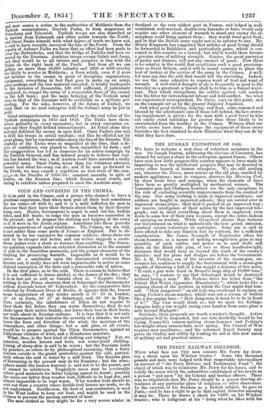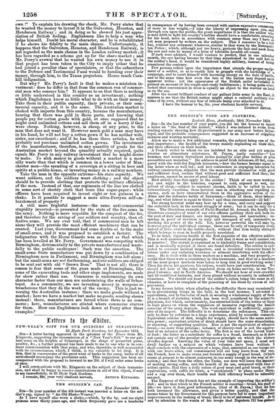THE PERRY RAILWAY COLLISION.
WITTE what face can City men censure Mr. Perry for draw- ing a cheek upon his Windsor trustee ? Some two thousand pounds and more were lodged with that respectable intermediary on account of " the Perry Defence and Testimonial Fund "; the object of which was to reimburse Mr. Perry for his losses, and to testify the sense which the subscribers entertained of his merits as a person "put upon "by his Colonel and brother officers. There was no stipulation that Mr. Perry should be a person dancing at- tendance at any particular place of religious or other observance. In the exercise of his freedom as a British subject, he goes to Paris,—and he has a right to go to that capital, however amusing it may be. There he draws a check for 1500/. on his Windsor trustee ; who is indignant at his "doing what he likes with his own !" To explain his drawing the check, Mr. Perry states that he wanted the money to invest it in the Galveston, Houston, and Henderson Railway ; and in doing so he showed his just appre- ciation of British feeling. .Englishmen like to help a man who helps himself. Doubt his moral character, and he is rehabilitated if he shows his fidelity to the main chance. Unfortunately, it happens that the Galveston, Houston, and Henderson Railway, is not regarded as the main chance in the London railway market ; it has been regarded as a scheme got up for the share-market ; and Mr. Perry's avowal that he wanted his own money to use it in that project has been taken in the City to imply either that he had joined a peculiar class of speculators, or that the subscribers to the Defence and "Testimonial Fund would be handing over their money, through 'him, to the Texan projectors. Hence much Corn-
indignation.
But why? Mr. Perry's fault is that he makes a mistaken in- vestment : does he differ in that from the common run of commer- cial men who censure him ? It appears to us that there is nothing so little understood in this country as an investment ; nothing which Englishmen know so little what to do with as their money. Take them in their public capacity, their private, or their com- mercial capacity, and it is the same. The Australian market is choked with imports from this country, because the manufacturer, hearing that there was gold in those parts, and knowing that people pay for cotton goods with gold, at once supposed that he might send unlimited cottons and sell them off in a hurry if they were cheap. Nothing, however, is cheap, at any price, to the man that does not want it. However much gold a man may have in his hand, he will not buy a cotton gown if he has neither wife, sister, nor sweetheart; and if he has these three articles, he will probably not purchase unlimited cotton gowns. The investment of the manufacturer, therefore, in any quantity of goods for the Australian market -beyond the quantity actually required, quite equals Mr. Perry in any railway investment that he might -desire to make. To sink money in goods without a market is a more silly waste than that which is common in a lower order of Man- chester men—the spending of a sovereign at a sitting in beer and spirits at a public-house, or investing money in a railway nowhere.
Take the man in the opposite extreme—his state capacity. We want soldiers, and the soldiers want -clothing; and the object should be to provide clothing that protects the military efficiency of the men. Instead of that, our regiments of the line are clothed in some sort of shoddy cloth that tears like sugar-paper; while officers have been required to invest eight or ten guineas in a shako. Is it possible to suggest a more ultra-Perryan self-em- bezzlement of property ?
A still more frightful instance—the same anti-commercial stupidity inverted—is presented by the state of the fire-arms in the army. Nothing is more requisite for the conquest of the foe, and therefore for the saving of our soldiers and country, than ef- fective arms. We are ever told, that if commercial men be left alone they will provide the most efficient machinery that can be created. Last year, Government had some doubts as to the make of small-arms, and it was proposed to establish a factory. The indignation with the Horse Guards was as great as that which has been levelled at Mr. Perry. Government was competing with Birmingham, detrimentally to the private manufacturer and waste- fully to the public exchequer! Such was the assertion. The small-arms State manufacture was put down by a combination of Birmingham men in Parliament, and Birmingham was left alone ; but the small-arms are not forthcoming, and our soldiers are obliged to be sent out with old "Brown Bess." That is not all; there is reason to fear that some of the guns made at Birmingham, like some of the excavating tools and other siege implements, are made for show rather than use. Commerce is undermining its own character faster than our men are undermining the walls of Sebas- topol. As a community, we are investing money in weapons so treacherous that they do the work of the enemy. This is just re- versing the Australian instance : there we make goods without a market; here we have a market but make no goods, sending shams instead: there, manufactures are forced where there is no com- merce; here, manufactures are stinted where commerce starves for them. How can Englishmen look down at Perry after these examples?



































 Previous page
Previous page